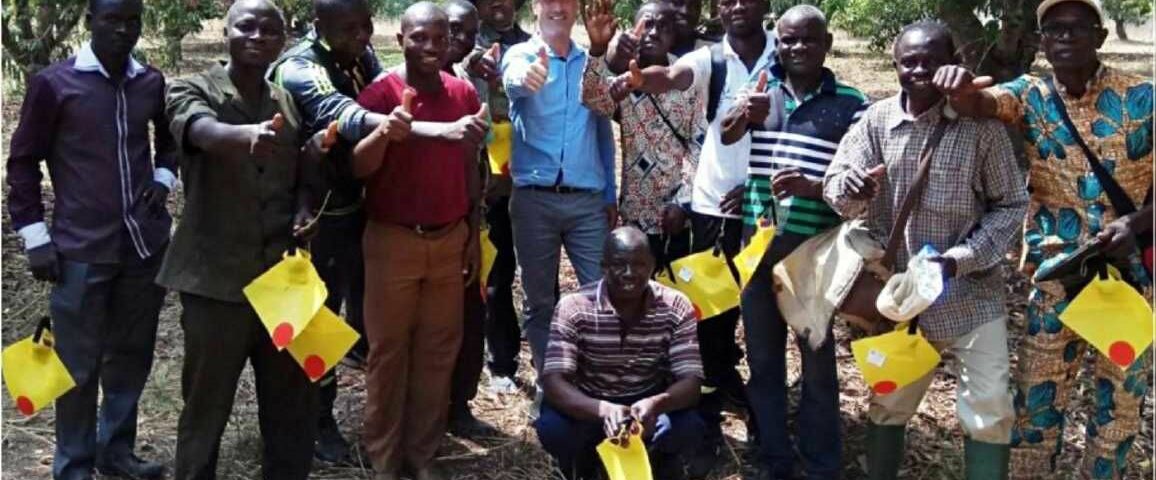In the Central Valley of Togo, a mango grower named Yacuobuo started killing his trees due to fruit-fly infestation that has decimated his crop over the past three years.
In this main mango-growing region of Africa, many other small farmers face the same dilemma. And their loss extends to the “mango women” who sell the fruit at market.
“Before 2010 [we lost] 50% [of the fruit], but now 75% of fruits are spoiled,” Yacuobuo said before the start of this year’s growing season. “The women would come and say, ‘We go to Lome [the capital city] after we see all the mangoes we bought from you are spoiled.’ And then I was discouraged, and after that I stopped. I didn’t sell.” When Israeli ag-tech entrepreneur Nimrod Israely heard Yakuobuo’s story, he relates, “I thought to myself, this is why I studied entomology; this is why I founded Biofeed! And so I simply said to Yakuobuo, ‘Let’s change it.”'
Israely, who has a PhD in fruit-fly ecology, invented FreeDome - a line of no-spray, environmentally friendly lures containing an organic customized mix of food, feeding stimulants and control, or therapeutic agents, delivered by a patented gravity-controlled fluid release platform to kill the tiny flies that destroy fruits and vegetables growing in Asia, Africa and the Americas.
His startup, Biofeed, demonstrated an overall decrease of Oriental fruit-fly infestation from 95% to less than 5% in a pilot test with Indian mango farmers.
Biofeed was introduced to the Togo government by Tel Aviv-based Start-Up Nation Central. In August 2017, Israely and Biofeed chairman Doron Afik met Togo President Faure Gnassingbei and promised to develop a special combined solution for the two fruit flies plaguing the Togo mango crop.
“It was like walking into a minefield,” says Afik, referring to the many unknowns he encountered, such as pinpointing the species and determining the scope of infestation.
Hung on the trees, FreeDome lures come in six varieties to combat different species
of fruit flies.
Biofeed’s team, in cooperation with the Togo Ministry of Agriculture and two local universities, found that West African mangoes are attacked simultaneously by Bactrocera dorsalis and Ceratitis cosyra fruit flies.
“For the fruit to reach harvest, both pests must be defeated. This is the new challenge we have taken on,” Israely tells ISRAEL21c.
Working with Prof. Komla Sanda, president of Togo’s University of Kara, Biofeed implemented the “Green Togo” project for the 2018 growing season.
They began field trials with the goal of reducing infestation by half compared to neighboring untreated orchards - and no less important, to gain the trust of the mango growers and restore their faith in their future.
“WE MEASURE our own success by measuring our profitability as well as the number of farmers using Biofeed’s solutions,” says Afik, noting that half of the country’s adults are engaged in agriculture, accounting for 33% of Togo’s GDP.
About one-third of the global population earns its livelihood from farming and more than 90% of the world’s farms are small like in Togo, Afik says. Even if the Biofeed solution were modestly successful, it could heighten food security and enable small farmers to export their fruit to Western countries.
Yacuobuo and other mango growers agreed to give the new double-duty FreeDome lures a chance. However, the farmers were used to picking their fruit before it was ripe, nervous that leaving it on the tree would lead to infestation. Israely had
to persuade them to wait.
“Working with our colleagues from the University of Kara, we laid out a plan for how harvesting would take place. We understood very well the farmers’ position - it is their annual livelihood they are putting at risk by holding off picking - but we needed to show them that they could trust the Biofeed technology to protect them from fruit fly infestation.”
At the end of the harvest season, Sanda’s team reported that Green Togo’s goal was surpassed. Infestation was reduced by more than 88% compared to mango orchards not involved in the project. In certain locations, infestation decreased 95%.
“We believe this is the first success of an attract-and-kill approach, under field conditions, against these two pests anywhere in the world,” says Israely, whose Kfar Truman-based company is one of 62 featured in David Wanetick's recently released book, Solution Nation.
The good results trickled down to the sellers.
“The going market price for mangoes remained the same for fruits unprotected by Biofeed, but doubled for fruits harvested in orchards protected by Biofeed,” says Afik. “Also, we enable the farmers to use the same land with the same amount of the scarce resource of water, but multiply the amount of produce.”
Israely says the improved harvest greatly benefited the mango women, who usually throw away 40-80% of the fruits due to infestation and rot.
As for Yacuobuo, he's now earning 10 cents per kilo. If he can export his mangoes he could make 10 times that amount.
Biofeed is working in additional African and Asian countries with similar results in each implementation, says Israely.
This summer, Biofeed was one of six Israeli startups chosen as winners in the Israel Innovation Authority’s Israel-India Global Innovation Challenges competition that will see pilot programs using innovative Israeli technologies in the fields of healthcare, agriculture and water management for India.
The company has signed a memorandum of understanding with the government of Gujarat to begin pilots there, www. Israel21 c. org
Published in Afik News 262 01.08.2018
